The Only Democracy? » Featured, On The Ground Reports » What if Bil’in held a demo and the army didn’t show up?
What if Bil’in held a demo and the army didn’t show up?
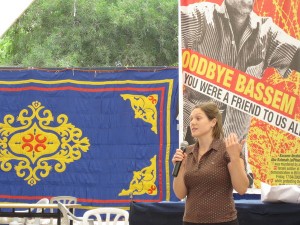
Emily gives a summary of Bil'in's legal actions under a poster of Bassem Abu Rahma, killed at a demo one year ago, April 17.
By Emily Schaeffer
Some of us have become so used to West Bank demonstrations meaning major Israeli army presence, and, typically, the use of weapons, that we have forgotten what demonstrations in a democracy look like. We’ve forgotten that a protest against oppressive working conditions in downtown New York City, or against oppressive abortion policies in Fredericton, Canada, or against wars in Afghanistan and Iraq in cities including London, Sydney, Paris, San Francisco and Toronto — means police presence only when the protests become so large that they overcrowd public spaces and need direction, when they damage city property, or (get this) when the protesters themselves might be at risk from onlookers with opposing views.
And so we attend demonstration after demonstration — from Bil’in to Al-Ma’asara to Hebron to Nabi Salah, and more — and we are enraged time and time again by the unjustified, disproportionate, immoral response of the army and border police.
But we hardly ever ask ourselves: why are they even here?
What would happen if the army didn’t show up one Friday in Bil’in, for instance? If the army hadn’t shown up on Friday, April 23, at the 5th Annual Conference Demonstration, then Eymad Rezqa (also spelled Imad Rizka, dedicated Palestinian-Israeli activist) would not have been shot in the head with a tear gas canister and rushed to surgery; 2 Italian demonstrators, one Israeli activist, 2 Bil’in residents, a Palestinian woman from Bethlehem and a Palestinian journalist would not have been lightly injured by direct shots or shrapnel of tear gas and shock grenade canisters, and as it is rumored from a new type of weapon; 3 Israelis, one Mexican citizen, and one Palestinian would not have been arrested and detained for nearly 12 hours, released on the condition that they post bail and stay out of Bil’in and Ni’lin for 15 days; hundreds would not have suffered from the horrible feeling of tear gas inhalation (which studies show may damage reproductive organs, among other risks); and several pre-teens and teens might not have risked being caught by army cameras today only to be arrested out of their beds tomorrow and called in for interrogation for stone-throwing, likely to be given months of jail time for an offense that in most countries would bring a fine or perhaps a few weeks’ community service.
The army has repeatedly claimed that their use of dispersal tactics (that have proven lethal) against the demonstrators is based on 3 main factors: 1) the demonstrations in and of themselves are illegal, as according to Israeli military orders a gathering of more than 10 people with a political or ideological purpose is an illegal assembly (and as of the latest military order it is illegal for Israelis to be within 200 meters of the wall); 2) they are responding to the dangerous stone-throwing by demonstrators, and in fact several soldiers and border police have been injured by these stones; and, 3) they are protecting the wall.
So technically when 10 Palestinians sit in a courtyard and discuss over tea the fact that they couldn’t access their fields yesterday they are committing an illegal act and should be tear gassed and/or arrested. Why does this sound logical to any thinking person? But let’s bring it to the more common example — the demonstration. Popular protest exists all over the world. Occupation is a scenario that logically leads to protest, and in fact under international law it is fully justified. Now Israel can compare itself to plenty of brutal occupations and dictatorships and perhaps still come out on top; but that’s not what Israel proclaims itself to be. Rather, Israel claims to be a democracy with the most moral army and occupation in the world. Under that paradigm, how can we reconcile the suppression of popular protest? Moreover, how can we justify it for 43 years and counting?
As for stone-throwing, we can all have mixed feelings about it, and for some it is the one contradiction to our repeated claims of a nonviolent movement. Still, if the army weren’t there, what reason would there be to throw stones? And if stones were thrown — because sometimes kids, everywhere in the world, pick up stones and throw them — who would they harm?
Now we come to the wall. Protecting state property — or military property. The army claims to the New York Times that if it didn’t show up, the fence/wall would be destroyed.
Rioters hurl rocks, Molotov cocktails and burning tires at defense forces and the security fence,’ the military said in a statement when asked why it had taken to arresting village leaders in the middle of the night. ‘Since the beginning of 2008, about 170 members of the defense forces have been injured in these villages,’ it added, including three soldiers who were so badly hurt they could no longer serve in the army. It also said that at Bilin itself, some $60,000 worth of damage had been done to the barrier in the past year and a half.”
Let’s put aside the fact that in Bil’in this wall is not only illegal under international law (because it illegally annexes occupied territory and what is more, for illegal settlements), but it is also illegal according to the High Court’s September 2007 ruling. Regardless, what the army is saying is that Palestinian lives (and those of their Israeli and international supporters) are worth risking in order to protect a set of metal objects (illegally placed there).
Now, one can imagine that the police would break up a group of people vandalizing or otherwise damaging a city hall, a museum building, a set of train tracks, or even private property in most democratic nations. But would they fire high velocity tear gas canisters directly at those people? Would they shoot rubber bullets? Live ammunition? Is this a proportionate — and dare I say — moral response?
Abdullah Abu Rahma answered the Israeli Army in that same New York Times article.
They want to destroy our movement because it is nonviolent,” he said. He added that some villagers might have tried, out of frustration, to cut through the fence since the court had ordered it moved and nothing had happened. But that is not the essence of the popular movement that he has helped lead.
‘We need our land,’ he told his visitors. ‘It is how we make our living. Our message to the world is that this wall is destroying our lives, and the occupation wants to kill our struggle.”
And now I will ask a different question. What would the demonstrators do if the army didn’t show up? One can imagine that at least the first few times the demonstration would have as much vigor and passion as any other day. Flags would be waved, chants chanted, brilliant and creative references would be made, and the media would capture them. But would demonstrators feel that their audience was missing? Would the media continue to show up week after week for a bloodless story in a culture of media sensationalism? Would the same frustration behind the stone-throwing be channeled somewhere we could support less?
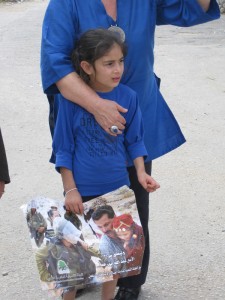
Luma, Abdullah Abu Rahma's daughter, distributes posters in solidarity with father in jail for participation in Bil'in's non-violent movement.
Or would the demonstrations grow in numbers? Would their messages and tactics become more creative and attention-drawing? Would leaders currently jailed for organizing nonviolent resistance be free to start and expand new political and social movements? Would villages no longer terrorized by night arrest raids have the freedom to focus on their daily lives and on resisting the rest of the oppressive occupation policies? Is this perhaps the real reason why the army shows up?
There are those who come to demonstrations once or twice and conclude that both sides need each other in order to feel at the end of the day that power and persistence were demonstrated. But I dare say that the nonviolent resistance does not need the army; rather, the army needs to violently respond to the nonviolent resistance in order to attempt to contain it, in order to report back home (a few dozen km away) and to the world that Palestinians must be violently reproached, in order to experiment with new weapons for the world’s weapons industry, and in order to use enough weapons to maintain the same budget demands from Israel and its foreign aid suppliers year after year.
The good news is that the Palestinian nonviolent resistance apparently cannot be contained, even in the face of such extreme violence. But it is taking its toll. And I only hope that we can all shake out of what has become a normal scenario for us, and re-sensitize ourselves to this completely abnormal, illogical and unjustified military response to popular protest, in order to bring this reality to Israelis and to the world.
Filed under: Featured, On The Ground Reports · Tags: Bi'lin, Protests Against the Wall
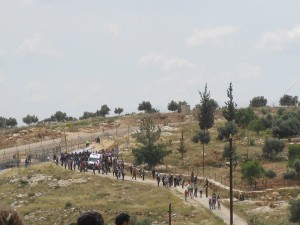
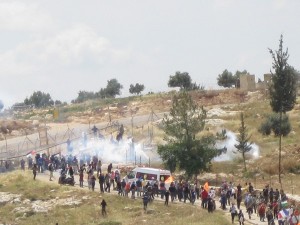
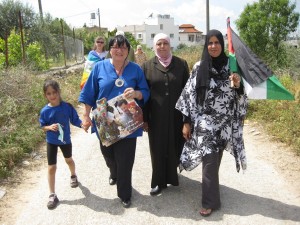








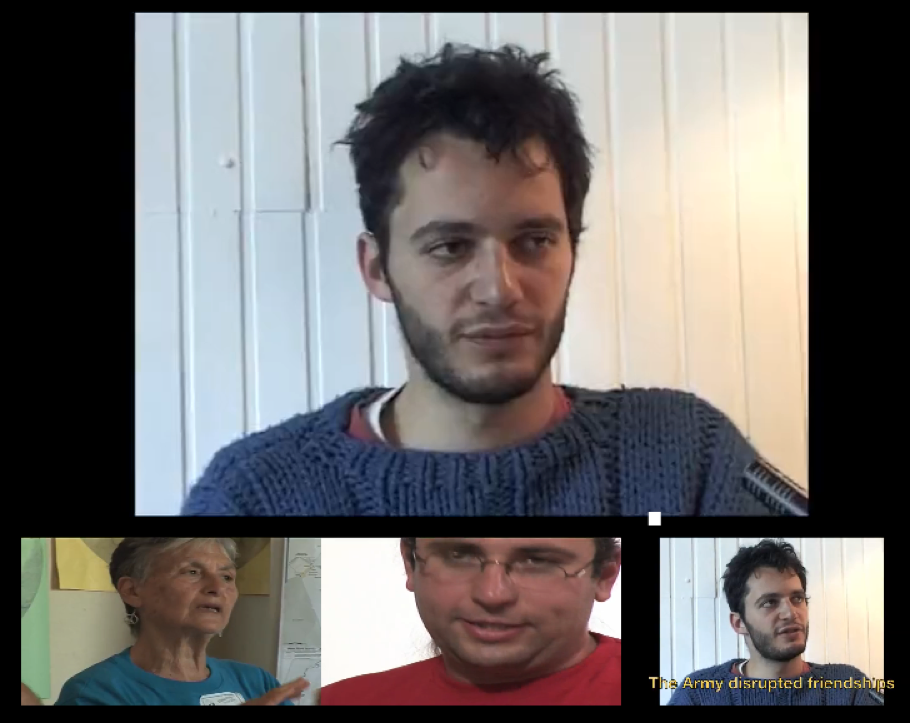 “You have a choice! Israeli Anti-Militarists Speak”
“You have a choice! Israeli Anti-Militarists Speak”